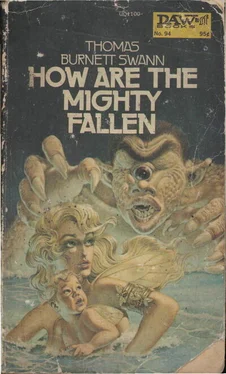Thomas Swann - How are the Mighty fallen
Здесь есть возможность читать онлайн «Thomas Swann - How are the Mighty fallen» весь текст электронной книги совершенно бесплатно (целиком полную версию без сокращений). В некоторых случаях можно слушать аудио, скачать через торрент в формате fb2 и присутствует краткое содержание. Жанр: Фэнтези, на английском языке. Описание произведения, (предисловие) а так же отзывы посетителей доступны на портале библиотеки ЛибКат.
- Название:How are the Mighty fallen
- Автор:
- Жанр:
- Год:неизвестен
- ISBN:нет данных
- Рейтинг книги:4 / 5. Голосов: 1
-
Избранное:Добавить в избранное
- Отзывы:
-
Ваша оценка:
- 80
- 1
- 2
- 3
- 4
- 5
How are the Mighty fallen: краткое содержание, описание и аннотация
Предлагаем к чтению аннотацию, описание, краткое содержание или предисловие (зависит от того, что написал сам автор книги «How are the Mighty fallen»). Если вы не нашли необходимую информацию о книге — напишите в комментариях, мы постараемся отыскать её.
How are the Mighty fallen — читать онлайн бесплатно полную книгу (весь текст) целиком
Ниже представлен текст книги, разбитый по страницам. Система сохранения места последней прочитанной страницы, позволяет с удобством читать онлайн бесплатно книгу «How are the Mighty fallen», без необходимости каждый раз заново искать на чём Вы остановились. Поставьте закладку, и сможете в любой момент перейти на страницу, на которой закончили чтение.
Интервал:
Закладка:
Jonathan awoke on David’s third ascent and ate as ravenously as if he had fought a battle. In spite of so rich a feast, following so long a fever, the wild honey forestalled a return of his nausea. They laughed and chattered without restraint: of little things and large things, of butterflies and eagles. Jonathan described his childhood on Crete, the war with the Cyclopes, the storm, and the swim to Philistia.
“I’m not surprised,” said David. “Everybody knows you came from Caphtor. I just didn’t know when or how.”
“And you don’t mind my wings?”
“Why should I? They’re as perfectly formed as a snow-flake.” “But they don’t do anything.”
“Neither does a luna moth, but we wouldn’t want to do without him, would we?”
“Did you really kill a lion with your bare hands, David?”
“Yes, but he wasn’t very big and he had a stomach ache.”
“How did you escape betrothal when you lay with a virgin at the age of twelve?”
“I told her a lion would get her if she told on me.”
Then it was David’s turn. “Where did you find your bear, Mylas?”
“The Philistines had trapped him on Crete and brought him to Gaza to show in a spectacle. My mother saw him in the eye of her mind and called him to me across the desert.”
“Did crossing the desert turn him white?”
“All of his race are white. I expect the sun bleached them a long time ago.”
“How old is your mother?”
“You might as well ask Samuel his age.”
“Are you ashamed any more?”
“Of what?” asked Jonathan, surprised.
“Loving me.”
“The sin of Sodom, you mean? No, I rather imagine the earthquake came on its own, not from Yahweh. It seems to me that prophets like Samuel get between us and the gods and warp our glimpse of the celestial faces. Even if Yahweh is angry, the worst he can do is change us into pillars of salt. Another thing. Samuel says that the Philistines are wicked idolaters. But in many ways they’re just like us. They’d rather be home by the sea than racing up and down the desert Before I got sick, I used to talk to an archer across the stream, and he said they disliked Goliath as much as we did. He ate up their best food and he had an odor and they were always having to supply him with women, some of whom he used up in a single night”
“You’ve changed your mind about a lot of things.”
“You’ve corrupted me.” Jonathan smiled.
“You’ve known me for less than a month!”
“Time is what happens to you. I would count you about ten years.”
“You look like a Philistine tree god,” David said, brushing a leaf from Jonathan’s hair.
“It’s better than looking like Yahweh, whatever he looks like. We aren’t supposed to make images of him, but I always picture him like Samuel, all beard and bones and chattering tongue.” He loosed the belt from his tunic, a band of leather inlaid with chips of turquoise. “Now I have a gift for you.”
“It’s a lovely gift,” said David. “But you’ve given me a tunic already, and what can I give you in return?”
“You Israelites.” Jonathan smiled. “You always think that one thing has to be paid for with another. An eye for an eye, a gift for a gift. But if you must give me something, let it be this: Let me always be first with you as long as we live.”
David laughed and hugged him against his breast “I'll promise more than that. Not even Sheol can separate us.”
“Whisper,” said Jonathan. “The wrong god may hear you.”
CHAPTER EIGHT
David, the slayer of Goliath, worked endlessly to increase his skill as a warrior. Jonathan taught him to use a spear and a sword; to feint, to wound, to kill. David, in turn, instructed Jonathan in the use of Assyrian slings. Hardened veterans, watching the Twin Archangels, as the youths had come to be called, unabashedly gathered stones in the streams and practiced against the fennecs and foxes of the desert, and no one thought to tease them for using “the toys of children.”
The armies of Philistia, disheartened but not destroyed, retired to their walled cities beside the Great Green Sea, Gaza, Askelon, and Ashedod, rather like a giant squid with injured tentacles withdrawing into a cave to recover its strength and tenacity. The might of Saul’s army-that is to say of Abner, Jonathan, David, and their rudely attired, ruggedly battling warriors-discouraged Israel’s neighbors from open war, and the young Israelite virgins, when they went to the wells to fill their pitchers, sang of their new hero:
“Saul has slain his thousands, David his ten thousands.”
If these exaggerated and heretical words came to the ears of the king, he did not acknowledge them, though David sensed an increasing suspicion in the king’s behavior toward him. When David had first appeared in the camp at Michmash, Saul had politely requested him to sing and play his lyre, praised his performance, and ordered a scribe to record the words on stone tablets or papyrus scrolls. Now, even if he closeted David from his men and, incidentally, the young virgins, he ordered him to play until David’s arms felt as heavy as copper and his mind was emptied of songs. Some of the time Saul was mired in madness or wearily climbing back to sanity, with little interest in ruling a kingdom which badly needed a ruler, or building an army which badly needed a commander to assist the aging Abner and the youthful Jonathan. He sighed and slept when Samuel denounced him and announced that Yahweh had withdrawn his favor, or when the people whispered that it was David, the slayer of Goliath, who would receive the anointing balm of royalty.
“Find that shepherd boy,” Saul would shout, whether at cockcrow time or lamplighting time, and then, with David kneeling before him, he would raise his hand to hush the chatter of Rizpah and Michal and order David to sing. It was a familiar sight to see Saul hunched on his throne of Lebanese cedar, in the thick-walled, turreted stronghold which served as both fort and palace at Gibeah, listening to psalms of thanksgiving or paeans of victory.
“Do you think,” asked David of Jonathan, going to meet their men, “that anyone suspects how it is with us?”
Jonathan smiled a slow, mischievous smile. “Who would dare to accuse the son of the king and the killer of Goliath?” Having faultlessly behaved for twenty years, he reveled in a sin for which at worst he might be stoned to death; at best, be exiled to the Desert of Sin. “We’re comrades in battle. We’re devoted friends. That’s the way we look to the people. My mother knows, of course, but not Rizpah, nor even Michal. Saul? He hardly seems to know we’re friends. To him, you’re still the lute player from Bethlehem. Why, he’s forgotten it was you who killed Goliath. In his ravings, he’s the hero of Elah.”
Jonathan… David loved to speak the name. It was charged both with wonder and familiarity, as wonderful as a phoenix, as familiar as a loaf of wheaten bread. Jonathan was no longer the stoically smiling, forever dutiful prince whom David had met at Michmash. His smile was not a concealment, it was a revelation, and laughter welled from his lips like water from the stone struck by Moses’ rod. Except for his skill in battle, he seemed younger than his years, but not in the sense that he had made of his tent a child’s playroom and retreated into its solitude as if he could arrest time. It was no longer as if he were escaping into the past, but bringing the past into the present; or rather, seeing the present with the wondering eyes of a child. He was young in enjoyment of the moment and expectation of the future. The alabaster statue was flushed with roseate flickerings of life. Saul and most of Israel, if they knew the truth, would say that it had cracked and stained. To David, it“-was infinitely more desirable for its humanizing imperfection.
Читать дальшеИнтервал:
Закладка:
Похожие книги на «How are the Mighty fallen»
Представляем Вашему вниманию похожие книги на «How are the Mighty fallen» списком для выбора. Мы отобрали схожую по названию и смыслу литературу в надежде предоставить читателям больше вариантов отыскать новые, интересные, ещё непрочитанные произведения.
Обсуждение, отзывы о книге «How are the Mighty fallen» и просто собственные мнения читателей. Оставьте ваши комментарии, напишите, что Вы думаете о произведении, его смысле или главных героях. Укажите что конкретно понравилось, а что нет, и почему Вы так считаете.












